
There has been little excitement this Halloween due to the coronavirus but last year some folks in the Hunter River region of New South Wales, Australia did go all out in celebration.
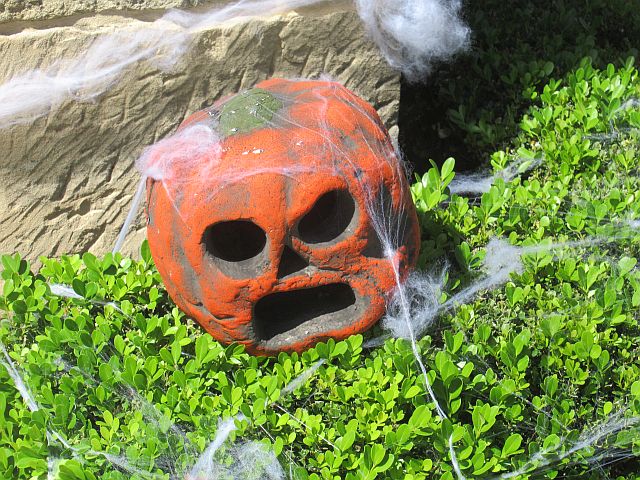
To some Australians, Halloween is just something the Americans do but its history goes way back to Britain and the British people and their belief in a time of the year in which the veil between the living and the dead, light and darkness is thinnest.

This time of a weakening of the veil between the living and the dead extends to All Souls’ Day. This year All Souls’ Day falls on the 2nd of November.
On All Souls’ Day in Britain it was customary for children to go a-souling. They would go door-to-door begging for cakes with crosses on them – soul cakes. There was a promise from the person receiving the cake to pray for the dead relatives of the person who gave them the cake to help souls go from purgatory to heaven.
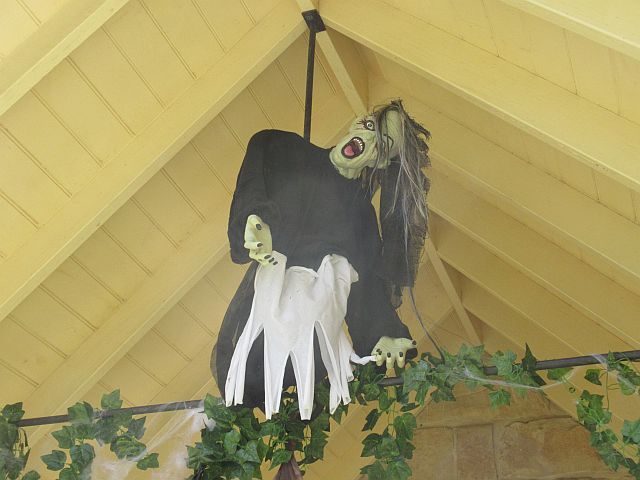
Here is a taste of the traditional Soul Cake Song: Soul! Soul! Soul-cake! Please good Missis, a soul cake! Apple, pear, plum or cherry, any good thing to make us all merry. One for Peter, two for Paul, three for him who made us all. God bless the master of this house, the mistress also, and the little children round your table grow. Likewise young men and maidens, your cattle and your store, and all that dwells within your gates, we wish you ten times more. Down in the cellar, and see what you can find, if the barrels are not empty, we hope you will prove kind. We hope you will prove kind, with your apples and strong beer, and we’ll come no more a-souling till this time next year.
A-souling is touched upon in an episode of the television show The Adventures of Robin Hood starring Richard Greene and Bernadette O’Farrell. (1955-1959). It is extremely doubtful it would be mentioned in any current British television show.
Please know and understand that not everyone at any stage in British, American or Australian history was well off. There was always poverty.
Bernard Cornwell, author of the Richard Sharpe novels, gives the strong impression that the British soldier during the Napoleonic wars came from the lower classes that more often than not could find no other employment.
Even after Queen Victoria became empress of India and the British Empire was doing well there was the poor not only in India but throughout the empire including Britain and Australia. Charles Dickens touched upon this in his short stories, plays and novels. Currently it appears the BBC has no love for Charles Dickens and his writing.
In Australia during the Second Boer War (1899 – 1902) many of the farmers from New South Wales who signed up to fight in it did not do so for love of empire but to save the farm through military pay. There was a severe drought on at the time.
It is definitely spring in Australia with new growth everywhere. There has been the return of the Eastern Cattle Egret to Corrimal, south coast New South Wales as well as the long-billed corella. Above is a fine example of the Eastern Cattle Egret.
I was surprised to find a Bar-tailed Godwit at Bellambi Lagoon. Usually they are found further south. Regardless, the bird seemed to be enjoying its experience in more northern waters.
At Wollongong Botanic Garden the Coots have been nesting and there is also a nesting Kookaburra. I interrupted feeding time when it came to a young Kookaburra in a tree and got growled at by the parent kookaburra. I backed away allowing the adult Kookaburra, with a lizard that has seen better days in its beak, fly to the tree that has the appropriate hole. This is all part of spring in the Illawarra.
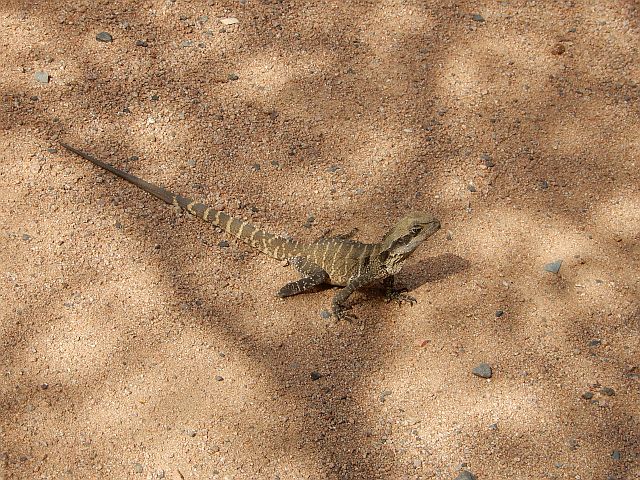
Lizards are back. Where there is water on the south coast of New South Wales, Australia you are likely to find a Water Dragon. Here is one found recently at Wollongong Botanic Garden. Don’t harm them. They are actually quite shy and harmless even if they can look fierce. They are out and about in spring and summer.
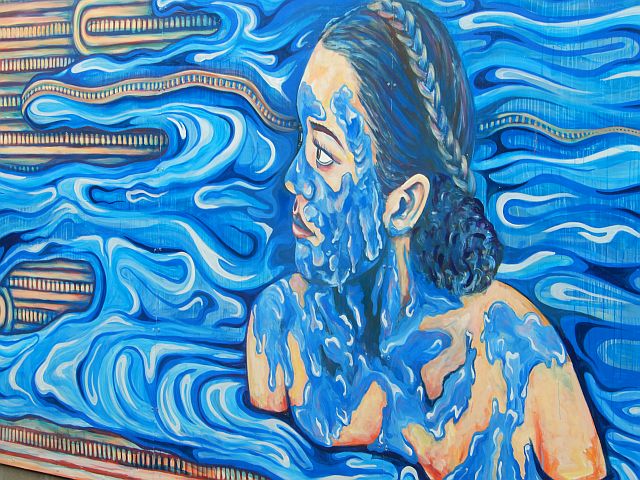
As promised, more on Rotorua, New Zealand. My visit took place in February this year. In another blog I touched upon the importance of the hot springs to this city and its culture. Here is an example of street art dealing with that importance. Please note the springs were not at their best when I visited due to a drought.
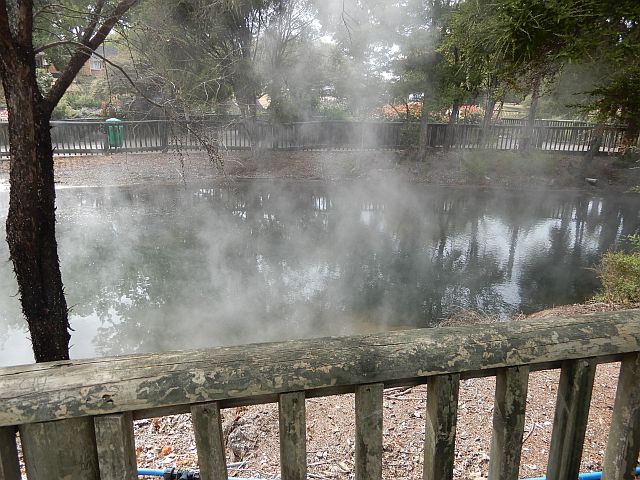
The smell of sulphur was only in the air when you got close to the heated water. Even so there were warning signs about visitors not getting too close to the bubbling action. Again I warn travelers over fifty. Do not get backpacker accommodation. I admit Auckland was worse in terms of backpacker discomfort but Rotorua was still bad. A room about the size of casket just isn’t good enough. This is especially true when it comes with lousy shower facilities.
There were swans and these strange looking ducks with white heads I had, up until then, never seen before. They were in and near the water at Rotorua.
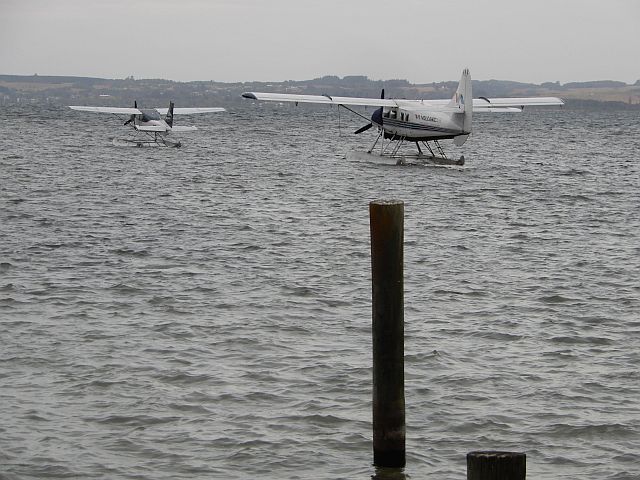
One way of viewing the outer small islands was by charter plane. New Zealand, geologically speaking, is a lot younger than Australia and this is evident in and around Rotorua. There are newly made islands with craters.
There are parks in Rotorua where you can take long walks. At the time of my visit in February the museum was closed due to necessary repairs because of an earlier earthquake. A bird sanctuary I also wanted to visit was closed. Nevertheless the parks did not disappoint. There was wildlife and some amazing sculptures. I particularly liked GREED! Among the wildlife there were Welcome Swallows.
I have mixed feelings about Australia in the 1970s. I was expecting more out of the disco experience. I found a lot of the music attributed to disco bland and robotic. Discos I suppose were fine if you were one of the beautiful people. If not you watched the dancers dance, get bored, drank, got drunk then wandered off to a train station for a train to take you home.
The Bee Gees were the band that made the greatest impact here in Australia as well as in the USA. Stayin’ Alive was one of their biggest hits. In 1978 they were in the movie Sgt. Pepper’s Lonely Hearts Club Band which was based on the music of the Beatles and contained Beatles songs. I liked it but it wasn’t all that popular. The storyline was simple and a little silly but that I didn’t mind. George Burns was in it and we got to see him tap dance possibly for the last time.
Doctor Who as a science fiction/fantasy television show and as a series of novelizations had something to offer. How we treat the environment and just how much plastic is around were brought up in the era of the third Doctor played by John Pertwee and also the era of the fourth Doctor as played by Tom Baker. Incidentally Katy Manning, who was Jo Grant in the time of the third Doctor, was once photographed with a Dalek. Both had their tops off.
Snippets from The Paul Hogan Show found on Facebook still make me laugh. It is comedy that was completely politically incorrect and could not possibly be played on television today. Dad’s Army and Some Mothers Do ‘Save ‘Em also had great laugh out loud moments.
There was marvelous science fiction in the movies including Superman (1978) starring Christopher Reeve. It came with new filming techniques and so now, at last, we could believe a man can fly.
Westworld starring Yul Brynner (1973) was quirky but fun. You had robots at a futuristic fin park sick of being damaged by visitors. Yul Brynner played a robotic gunslinger with an itch trigger finger. He looks like he just stepped off the set of The Magnificent Seven only in this film his character doesn’t have humanitarian instincts.
Meanwhile the Hammer people in the UK were grinding out excellent atmospheric horror. I think The Vampire Lovers (1970) was the first time I got to see a bare female breast on screen at the local cinema.
Movie makers for a while saw big money in making R for restricted films. Alvin Purple and also The Devils were great examples of this trend that didn’t last long. Alvin Purple (1973) starring Graeme Blundell and a sex goddess known as Abigail was a sex romp about an average looking guy women for some reason are powerfully attracted to. The Devils (1971) starring Oliver Reed was a gory semi-historic epic based on Aldous Huxley’s novel The Devils of Loudun (1952). Huxley is best remembered for his novel Brave New World (1932).
Of the books that I remember reading and enjoying there was Jonathon Livingston Seagull by Richard Bach (1970), Bury My Heart at Wounded Knee by Dee Brown which was non-fiction (1970), The Crystal Cave by Mary Stewart (1970), Spock Must Die! by James Blish (1970 Star Trek), The Impossible Virgin (a Modesty Blaise adventure) by Peter O’Donnell (1971), Watership Down by Richard Adams (1972), Carrie by Stephen King (1974), Doctor Who: The War Machines novelization by Ian Stewart Black ( 1975), The Eagle has Landed by Jack Higgins (1975), and The Hitchhiker’s Guide to the Galaxy by Douglas Adams (1979).
Of the television shows I remember from the 1970s there was Fawlty Towers, Columbo, Wonder Woman, The Amazing Spiderman live-action (a real dud), Number 96 (as a lad I was intrigued by occasional female nudity), The Sullivans, Against the Wind, The Aunty Jack Show, The Paul Hogan Show, Dad’s Army, Some Mothers Do ‘Ave ‘Em, Steptoe and Son, The Good Life, Space: 1999, All Creatures Great and Small, and Randall and Hopkirk (deceased).
The movies that were great in the 1970s included Kelly’s Heroes (1970), The Vampire Lovers (1971), Twins of Evil (1971), Clockwork Orange (1971), The Devils (1971), Alvin Purple (1973), Soylent Green (1973), Westworld (1973), Captain Kronos – Vampire Hunter (1974), Sunday too Far Away (1975), Three Days of the Condor (1975), Robin and Marian (1976), A Bridge Too Far (1977), Superman (1978), and Being There (1979).
By the mid-1970s the British suffered a downturn in fortunes. Punk music came out of this. In the 1970s there were financial losses in the Australian wool industry. The synthetics had made an impact on clothing that would last.
We Australians got out of the Vietnam War in 1972 thanks to a change in government.
Britain entered the European Union in 1973 and the British are now desperately trying to get out. One reason is fishing rights. The British want their fishing rights back and I can’t blame them.
So, in summing up, the 1970s could have been better but they were not a complete washout.